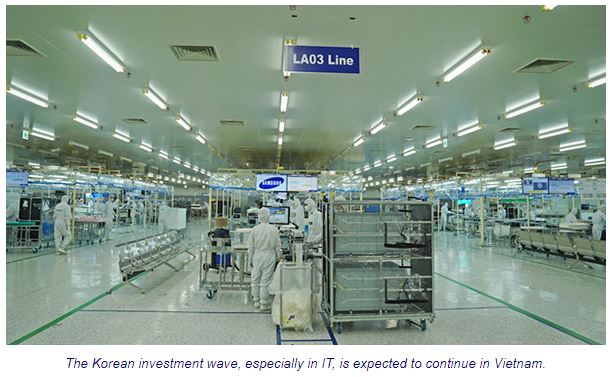Incentive policies appeal to Korean investors to Vietnam’s high-tech
Vietnam is seen as an increasingly attractive investment destination for many South Korean firms, supported by the country’s growing demand for high-tech products and the government’s incentives applied for the industries.
According to Choi Gangsun, Director of Korea-based Gyeonggi Technopark, which is home to more than 80 knowledge-based hi-tech firms and research institutes, Korean investors are keen to invest in high-tech industries in Vietnam due to the incentives that the country has offered to foreign investors.
In addition, Gangsun said, Vietnam’s demand for high-tech products is expected to increase over the years as young Korean businesses want to promote cooperation in the future.
Sharing the same view, Eunyoung Jung, CEO of HSBC South Korea, told the media that Vietnam has a thriving economy and is one of the most attractive investment destinations for Korean investors.
Investors from South Korea no longer see Vietnam as their manufacturing base, but instead as one of their markets with the most potential, Jung said.
Among new emerging markets, Vietnam’s economy is known for political stability, a skilled labor force, competitive wages and good policies, as well as strong economic growth.
South Korea’s investment in Vietnam last year recorded significant growth of 60.3% against 2017, with the total amount reaching US$3.16 billion.
According to experts, the Korean investment wave is expected to continue in Vietnam, especially in the fields of IT, renewable energy, retail, finance, real estate and infrastructure.
Gov’t plans support
Besides Korean investors, high-tech firms from other countries are also selecting Vietnam to set up their production bases thanks to the Vietnamese government’s plans to improve the quality of FDI inflows in recent years.
The government has so far issued many preferential policies to attract investors in high-tech projects, especially those operating in the country’s three high-tech parks in Ho Chi Minh City, Hanoi and Danang.
In the Hoa Lac Hi-Tech Park (HHTP) in Hanoi, for example, investors who implement a new project worth at least VND4 trillion (US$176 million) will enjoy corporate income tax of 10% for 30 years while the country’s standard corporate income tax (CIT) rate is 20%.
Investors will also receive incentives on tax, land rental and land use fees if they develop housing projects for laborers working at HHTP.
Besides this, the Hanoi People’s Committee will prioritize the allocation of sufficient land funds for housing projects for the HHTP’s workers.
According to Pham Dai Duong, deputy minister of Science and Technology and head of the HHTP’s management board, fine-tuned investment incentive policies as well as improved infrastructure facilities and removed land-clearance barriers have helped HHTP to better attract investors.
Investors in the Da Nang Hi-Tech Park (DHTP) have also enjoyed many special incentives on corporate income tax (CIT), import duty and land rental.
Specifically, investors in DHTP will be exempt from CIT for the first four years and then will enjoy a 50% reduction of the payable tax for the next nine years. A CIT rate of 10% will be applicable for 15 years and large projects valued at more than VND3 trillion (US$133 million) will even enjoy such 10% CIT rate for 30 years.
An exemption from import duty will be applied for investors in DHTP for the first five years for raw materials and accessories that cannot be domestically produced.
Many high-tech projects in DHTP are also eligible for free land rental for the entire term of the investment project, and are required to pay only construction costs, utilities, and other disbursements.
Investments in high-tech projects will continuously receive more preferential treatment in the time ahead when the government continuously plans to give top priority to high-tech industries in the nation’s new FDI attraction strategy in the next decade.


 English
English




